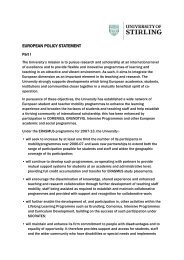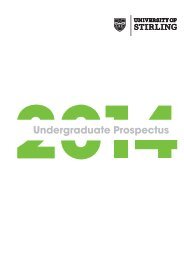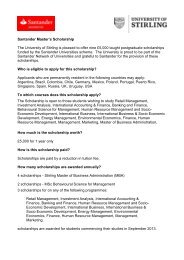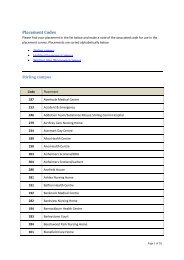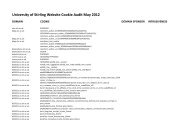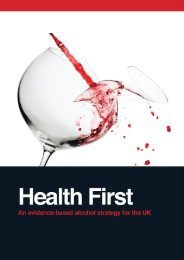Supporting a uK SucceSS Story: The impacT of - Research Councils ...
Supporting a uK SucceSS Story: The impacT of - Research Councils ...
Supporting a uK SucceSS Story: The impacT of - Research Councils ...
You also want an ePaper? Increase the reach of your titles
YUMPU automatically turns print PDFs into web optimized ePapers that Google loves.
A number <strong>of</strong> new technologies will be used to test for banned<br />
substances. For the first time in an Olympic Games, full scan high<br />
resolution mass spectrometry will be used to provide the most<br />
comprehensive data on the composition <strong>of</strong> the athletes’ urine<br />
samples. <strong>The</strong>se data sets will then be examined to determine<br />
whether any banned substance is present. Indentifying the presence<br />
<strong>of</strong> pseudo-endogenous substances represent a particular challenge.<br />
For example, growth hormone is a natural hormone and therefore<br />
could be expected to be found in an athlete’s blood. Also, the level<br />
<strong>of</strong> growth hormone will change dramatically throughout the day.<br />
<strong>The</strong>se challenges have made the development <strong>of</strong> a test for growth<br />
hormone a priority for WADA and UK Anti-Doping. Although<br />
there is a test currently in use, it can only be used within a short<br />
time frame. <strong>Research</strong>ers based at the University <strong>of</strong> Southampton,<br />
King’s College London and University <strong>of</strong> Kent at Canterbury are<br />
developing a biomarker test that can be used over a longer period<br />
<strong>of</strong> time. <strong>The</strong>se biomarker proteins rise when growth hormone is<br />
administered and remain high for several weeks which can give<br />
drugs testers a longer window <strong>of</strong> opportunity to detect banned<br />
substances. Any test used in anti-doping must be robust and<br />
withstand legal and scientific challenge. <strong>The</strong> research team has been<br />
working to address these issues to ensure that the test is water-tight<br />
at the point <strong>of</strong> its introduction.<br />
“<strong>The</strong> team have<br />
studied warm up<br />
techniques that<br />
involve doing<br />
high-intensity<br />
exercise known as<br />
“priming”, before<br />
the main exercise<br />
session or race.”<br />
Drugs and doping – an education<br />
<strong>Research</strong>ers at Liverpool John Moores University<br />
have looked at how effective anti-doping<br />
systems have been in the past and what could<br />
be done to improve them. It highlighted the<br />
need for international collaboration between<br />
the International Olympic Committee (IOC),<br />
governments and sports federations, which<br />
then happened in the form <strong>of</strong> the WADA. <strong>The</strong><br />
researchers also looked at the use <strong>of</strong> over-thecounter<br />
drugs, such as medicine for colds and<br />
other illnesses, and whether they actually affect an<br />
athlete’s performance. Often these drugs are taken<br />
by athletes without them being aware that they<br />
are actually banned substances, so the researchers<br />
have gone onto look at education around drug use<br />
in sport. It is hoped that by educating people more<br />
about the dangers and illegality <strong>of</strong> doping, fewer<br />
athletes will be tempted to use drugs.<br />
<strong>The</strong> researchers at Liverpool John Moores along<br />
with colleagues at the universities <strong>of</strong> Manchester<br />
and Greenwich have developed a new education<br />
programme for pharmacy volunteers at the<br />
London 2012 Games having recognised that<br />
nothing similar was currently <strong>of</strong>fered in the UK.<br />
This programme has also been available to all<br />
healthcare pr<strong>of</strong>essionals in the UK to help them<br />
deal with both elite athletes and members <strong>of</strong><br />
the public who participate in sport and exercise<br />
and may or may not use performance enhancing<br />
drugs.<br />
<strong>Research</strong> at Leeds Metropolitan University has<br />
found that drugs testing alone is not enough<br />
<strong>of</strong> a deterrent to stop athletes from taking<br />
performance enhancing drugs. <strong>The</strong> researchers<br />
from the university’s Carnegie <strong>Research</strong> Institute<br />
investigated athlete’s beliefs and willingness to<br />
use performance enhancing drugs and found that<br />
more emphasis needs to be placed on doping<br />
prevention and education to change perceptions<br />
<strong>of</strong> doping. <strong>The</strong> research also found that an<br />
athlete is highly influenced by their coach and so<br />
coaches must be made a priority group for antidoping<br />
education. Work in this area is ongoing to<br />
understand what makes an athlete decide to use<br />
drugs and this research will inform future antidoping<br />
education.<br />
SECTION two : Health and Wellbeing 23





